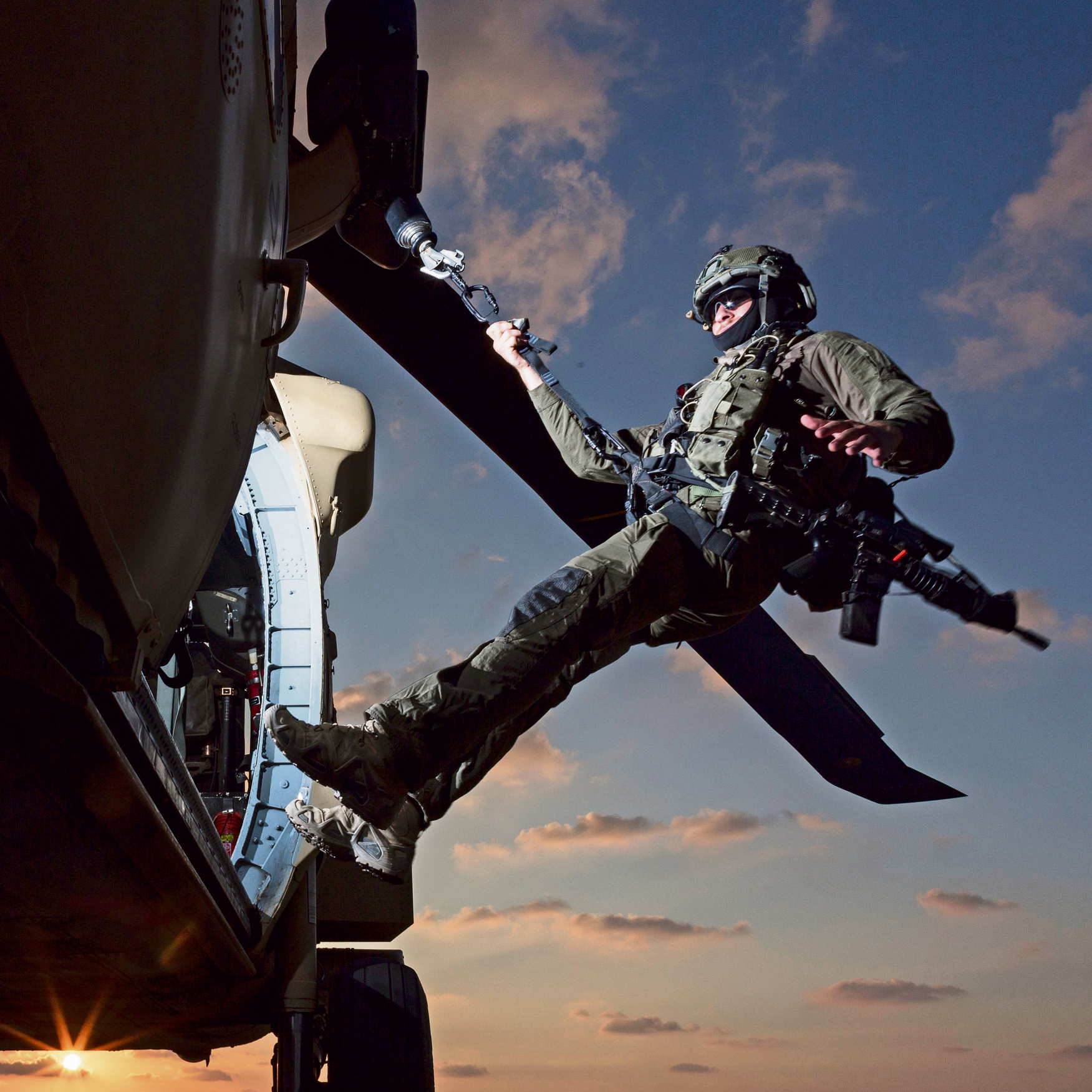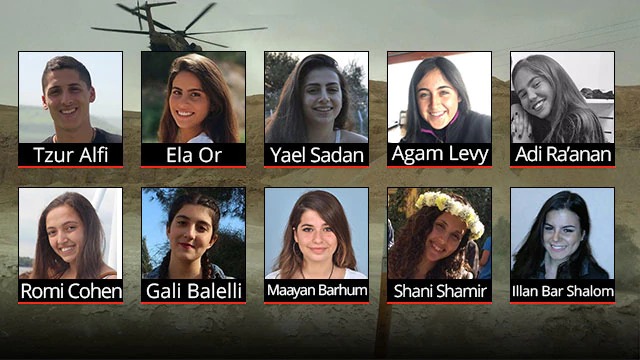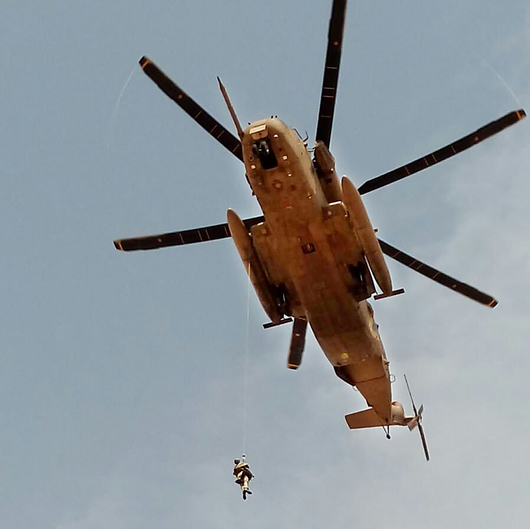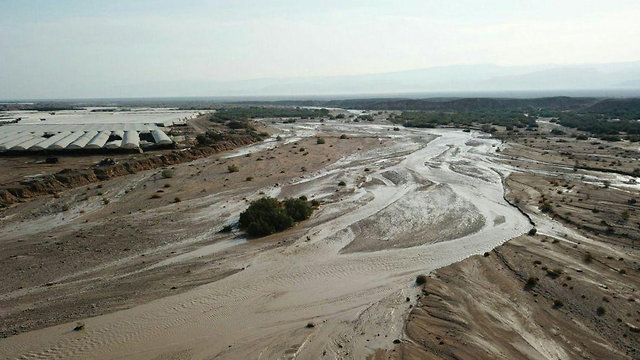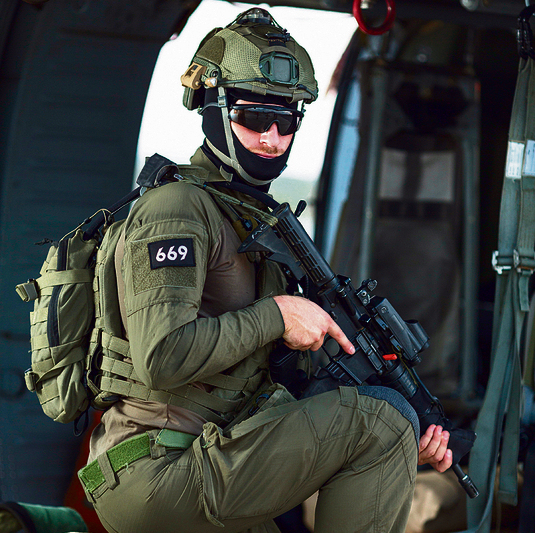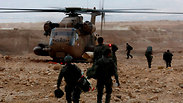
669 paramedic describes Zafit Stream rescue operation
They are trained to rescue and evacuate wounded soldiers under fire, operating far beyond enemy lines, but even for these trained professionals, the Zafit Stream disaster, which claimed the lives of 10 teens, was a particularly traumatic event.
In his forthcoming book, "From zero to a 100"— which will be published in the coming months by Yedioth Books—Guy, a paramedic in IAF's special Airborne Rescue and Evacuation Unit 669, describes a day that started just like any other day, but ended with the dramatic rescue operation for missing teens who were swept away in the flooding of the Zafit Stream.
Guy, 24, from Hoshaya community settlement in northern Israel, was released from the army a few months ago, after a long army service. From the beginning of his basic training course until his discharge day, Guy documented his experiences as a paramedic in one of the IDF's most elite and intriguing units.
Unit 669 participates in every possible combat scenario— from rescue and evacuation missions under fire to secret operations beyond enemy lines—and its skilled soldiers possess all the necessary fighting and rescue skills.
Rescue fighters on call in Tel Nof or Palmachim air bases don’t know where their job will take them in fifteen minutes—will they be on their way to rescue hikers caught in a flood? Or wounded soldiers trapped in the heart of Gaza? For this reason, they must be prepared for every possible scenario.
The following is an excerpt from Guy's book which describes the dramatic rescue operation of high school student from the southern Zafit Stream, following the flash flood disaster which left 10 teenagers dead.
The names of the unit's combat soldiers, commanders, paramedics, and doctors were changed for information security purposes.
* * *
I'm sitting down inside the helicopter. The mechanic nods back at me. Just as he opens the Black Hawk's door, I shout "Gonen, I'll be discharged soon; this is my last rescue operation!"
"Good luck, Guy!" Gonen says with a fatherly smile. Because of the age difference between us, he could have been my father.
Gonen opens the Black Hawk's door and the cable pulls me back. Turning to the two remaining fighters inside, I stand on the threshold of the helicopter door, looking down at the stream that bends back and forth hundreds of feet below me.
The helicopter descends as Gonen lowers me to the ground. Like in a dart board game, he has to point me like an arrow and carefully place me on a big rock on which Yochai, the squad commander, and Alex, the doctor, are waiting.
I am suspended in the air, 65 feet above ground, when I begin to stretch my legs as far as I can, preparing to hit the ground. Yochai reaches out his hand and I land gracefully on the ground.
We quickly climb up the steep slope of the mountain before us, getting closer to the injured man who is trapped over there. He is fully conscious and screaming with pain. While hiking on the mountain, he unexpectedly fell from30 feet and rolled downhill until he stopped here, on the rocky ground.
His right leg is shattered. He is losing blood quickly. Alex and I stop the bleeding and administer First Aid on the ground. "Yossi, how are you feeling?" I ask him gently. "Okay... is there any chance I could keep my leg?" he mutters, under the heavy influence of morphine.
"There is a chance Yossi, there is definitely a chance," I tell him. This is not the time to tell him that chances are slim.
"It is a 15 minutes' flight to Hadassah Medical Center," Yochai announces on the radio, while Yossi screams in pain. I prepare another dose of morphine and consider whether to administer a blood transfusion.
* * *
"Guys, listen to the radio!" Yochai suddenly calls out. "There is another incident in the south. It is not yet clear what is going on. Air force control center instructed us to fly over there as soon as possible. We will land at the hospital in seven minutes," the pilot says.
We continue to treat the injured man and prepare him for landing. Anxiety levels soar. We land at Hadassah. The ambulance is waiting for us at the landing. Alex and I update the medical team. "Guy, we've got to get out of here, go back to the helicopter!" Yochai shouts.
"Yossi, feel better, good luck," my comrade whispers in Yossi's ear. He mutters something that sounds like 'thanks', and we quickly run back to the helicopter and take off.
I open the radio.
"There is a report about an incident in the south. The situation is still unclear; the 669 crew is on is on its way from Tel Nof to the south. You will fly to Nevatim Air Base to refuel."
We're flying south. Jerusalem Mountains are quickly replaced by the yellowish landscape of Hebron and the northern Negev. I take my cell phone out of my pocket, remove my latex gloves with my teeth, and write to Gili, my girlfriend:
"Hi sweetie, I'm in the helicopter, we'll probably be back in Palmachim in an hour. We'll go on our trip as planned."
Five minutes before landing in Nevatim, the pilots receive an update: "this is apparently a school bus that was swept up by a flood in the Arava Stream, get fuel as fast as possible and head out."
I look outside. This is the end of April. The air is foggy, but there are hardly any clouds. They talked about rain, but a flood? What the hell is going on here?
In the meantime, more details about the incident start coming in: "apparently parents and children went hiking in the Arava Stream and were caught in a flood. There are over 20 missing persons."
What the hell is going on here? I try to imagine the scene we are about to witness. Frightened parents and children are stranded on a mountain, injured. I remind myself the correct order of operation, and memorize the dosages of children's medicine.
* * *
Gonen opens the door. Yochai and I walk towards the on-scene commander, a police officer in blue uniforms and senior ranks.
"It's a pre-military academy school trip," he says, trying to catch his breath.
"The flood caught them by surprise, they found the first body."
"Found what?" I ask, not sure if I heard correctly.
"A body!"
I feel as though I have been punched in the stomach. I had already seen what happens to a person in a flash flood, but I refused to acknowledge it. The word "body" resonates in my ears for a few seconds.
The helicopter is flying low. A group of boys are standing 30 feet up a steep slope. They look frightened, but they're standing on their feet, waving to the helicopter. The water blocks them from one side, while on the other side — a cliff.
"We just got a call about two figures drifting in the water further down the stream!"
"But there are people here who need to be rescued, we don't know what's their condition and what can happen to them," my comrade says.
"Should we begin to rescue these people, or take a risk and continue to look for these figures further down the stream?" the pilot asks.
"Keep going!" we are told.
Everyone's eye turn outward as the helicopter continues its slow flight down the stream.
65 feet down the stream, in a widening curve, two figures are stretched out motionless on the ground, a few feet from the water surface. The right hand of one rests on the left hand of the other. Blood drips from one figure and a huge bush covers the other's face. Despite the wind caused by the helicopter, they lie immobile on the ground, their skins pale as chalk.
"I see two bodies!" someone calls on the radio.
"Two injured!" The commander shouts. "You will not mention the word 'body' until you physically touch it."
* * *
My face is glued to the plastic window of the helicopter, looking for any sign of life: something moving in the stream, an item of clothing—anything. I cling to the hope that there is someone out there we can save.
"Down here!" my comrade screams eagerly. I quickly pass to the other side of the helicopter and look out the window. Just below us we spot a shoe, further down you can see the shapes of a body.
The mechanic opens the door and we jump off. We step into the stream until the water reaches our waists. It's pretty warm. The ground is muddy. We make our way through, clinging to the slim chance that there is life on the other side.
We arrive, panting. "Guy, check the pulse, give me a rundown," says Yochai behind me.
We pull the body out of the murky mud and turn it over—a beautiful girl. Dark bruises and scratches cover her body. Her bright eyes are wide open. I put my fingers on her neck, searching for a pulse, but in vain. I shake my head and gently shut her eyelids.
"Please bring us a stretcher and a gray blanket," Yochai asks.
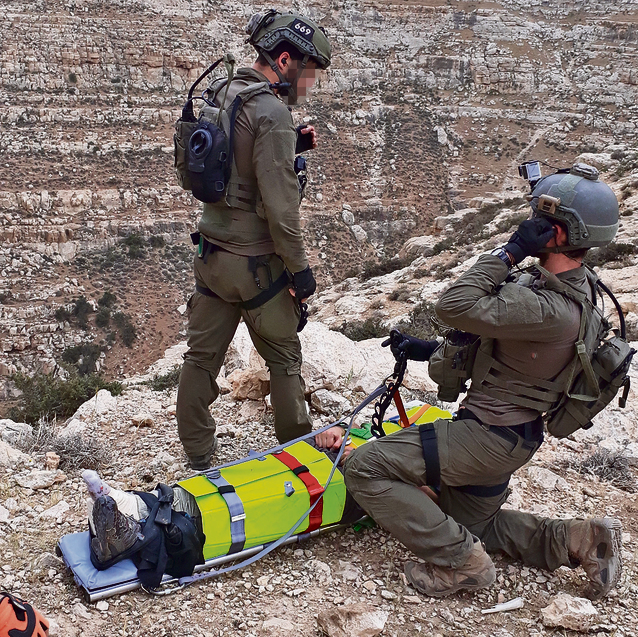
* * *
My comrades, Davidi and Shemer, spot two figures lying down motionless on the ground. The pilot tilts the helicopter slightly to the right and they land on the banks of the stream.
They run towards the two frozen figures. The first one turns out to be a young boy. The boy begins to cry as soon as Davidi comes near. The other figure, a curly-haired girl with bright eyes, screams in alarm, as if we removed some magic spell. Her hair is tangled in a thorny bush and she has a deep cut on the side of her body. Davidi approaches and sits down. Another soldier examines the boy. His big eyes look fearful. His entire body is covered with scratches and bruises.
The two weep.
"They're both alive, I repeat, the two injured youths are alive!" they report on the radio. Davidi wraps the weeping girl in his arms. He embraces her and whispers: "We're here to rescue you; everything is going to be okay."
* * *
"Take a look at six o'clock, what's that white thing over there?" The pilot asks.
"It looks like a piece of white cloth," mutters the mechanic.
"What do you suggest we do?" The pilot asks the lieutenant.
The lieutenant thinks. He has been a rescue fighter for many years and has seen almost everything. But how can you tell what's going on here? It could be just a piece of cloth, and it could also be a sign of an injured person seeking help, or a corpse. Do you risk a fighter's life for a piece of cloth?
"Can you even get a fighter down there?"
"I think so," the mechanic mutters.
"Ron, get ready to go down, start tying a loop," says the deputy commander.
The mechanic, almost 300 feet above Ron, is playing with the cable and with Ron like a marionette. With one skillful gesture, he hits the target and lands Ron on the ground.
Ron moves his body away from the crumbling limestone walls. He is an experienced fighter who had participated in dangerous rescue operations. But he never went into a stream by himself.
One thing he does know: he mustn't drift off into the waterfall. Climbing slowly toward the white piece of cloth, he hears noises and leaps over the curve.
In front of him, on the edge of a rock, near the running water, stands a boy waving a white t-shirt in the air. You cannot see the helicopter from here. The boy is waving his shirt slowly, in despair. Behind him are three other teens, two boys and a girl, crammed inside a small cave. The four of them look at Ron in amazement.
"Hey, I'm Ron, are you all right?" He asks, panting. The four nod. They look exhausted, but healthy and sound.
Ron straightens up, wipes the sweat off his forehead and smiles: "I've come to get you out of here."
* * *
We sit in our little helicopter. Behind me, covered with a gray army blanket, lies the body of the girl. I look out, searching for a sign, a clue. If only we could find someone we can help.
"Yochai, look ahead!" I hear the pilot calls in the radio. We all look ahead and spot a figure lying face down on the muddy ground.
Our helicopter lands on the bank of the stream, near a swamp. A moment before we get off, Yochai asks for a "stretcher and a blanket."
Our wall of denial is quickly falling apart.
* * *
We fly to the stomping ground to evacuate the bodies. This is our second fly today. Each time we bring a girl, and come back to bring another.
I look at them. They lie silently inside the helicopter, covered in gray army blankets. I am trying to keep my cool, but I feel like I'm choking as I struggle to stop the tears from falling. My hands are shaking. No one dares to speak.
The second girl had to be plucked from the mud, leaving a hole in the ground where she was lying. Her gaze is calm and relaxed. Her hair is tangled in desert bushes.
Not far from the girl's body floats a large purple backpack. "We'll bring the bag with us to the helicopter, so that the parents will have one final memory," I mutter to Yochai. The bag was terribly heavy, soaked in water. Now it is lying next to me on the helicopter floor. Colorful clothes spill out of it.
I look at them with blurred eyes. Why the hell are they all girls? What kind of pre-military academy is this? I look at my comrades who are watching the covered stretchers with damp eyes.
* * *
The radio booms in my ears. The reports do not stop. It's unbearable.
Another helicopter found another body. We still don't know how many injured or dead teenagers are waiting for us down the stream. We receive warnings about the weather—it is going to rain soon. Fighter jets fly above us. My head is exploding. I drop the radio transceiver. Suddenly—quiet.
I imagine the victim's families who still don't know that their world has turned upside down. Whole families would collapse in a moment. One phone call. A knock at the door. 'Your daughter will not be coming home.'
We land at the pick-up area. A long line of ambulances is waiting. People are crying everywhere. I put the stretcher at the end of a long line of covered bodies. A stretcher and another stretcher lie mute.
We fly a few hundred feet and land in a large dirt field where a control room was set up.
There are thousands of people there: vehicles that were stopped on Route 90, hundreds of police officers, firefighters and members of the police rescue unit.
I approach Yochai. He puts his hand on my shoulder. "Bro, I'm wrecked. This was heavy," he says quietly, without looking up. "There are no words to describe this rescue operation," I say. "Yes," Yochai mutters quietly. His eyes move from side to side, as if looking for an anchor to hold onto.
"Guy, the only thing that keeps me from falling apart is knowing that we did the right thing. without us and without all the fighters who came here from Tel Nof or from home, they couldn't have evacuated all the injured and bodies. I nod, biting my lower, lip and sighing.
Yochai's phone rings.
"Yochai, there's a call for you: a police vehicle got swept by the flood on Route 90 in the northern Dead Sea area."
"Copy. We are on our way," Yochai replies. His back straightens up and his broad shoulders tighten. "Come on Guy, load the equipment, get ready for takeoff, there's someone who needs us," he shouts and runs toward the on-call room.










